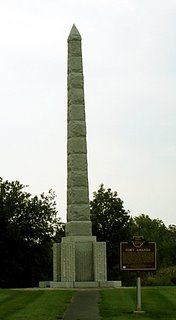Colonel Taylor destined his son William for the Army, while Zachary was to be a farmer. The former died soon after entering the service and Zachary, earnestly desiring a military career, received from President Jefferson a commission as first lieutenant in the Seventh Infantry. This commission was dated May 3, 1808, a few months before Zachary Taylor s relative, James Madison, was elected president of the United States.
The young officer reported to
General Wilkinson at New Orleans, but was soon stricken with yellow fever and forced to return home to be nursed back to health. His marriage occurred about a year later and on November 30, 1810, he was promoted and became a captain. In 1811 his regiment, the Seventh, marched northward with the Fourth Infantry to serve under General Harrison, then governor of the Northwest territory, who was endeavoring to subdue the Indians.
The battle of Tippecanoe was fought November 7, 1811. The second war with Great Britain began in less than a year the act declaring war was dated June 18, 1812 and in September the young captain had his first real baptism of fire. In command of a single company of the Seventh,
he was defending Fort Harrison when, on September 10, 1812, it was attacked by the Indians, who greatly outnumbered the little garrison, and there he displayed such bravery, skill, and resourcefulness in defense that he was warmly praised by his superior officers and was brevetted major by the President.
His service against the Indians of the North west continued until the close of the war, and on May 15, 1814, he received the full rank of major and was assigned to the Twenty-sixth Infantry. He then led
an expedition against the Indians and their British allies on Rock river and further distinguished himself.
[Source]















